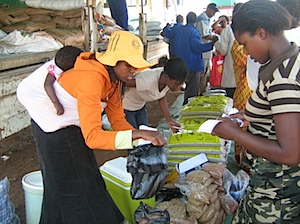- When Cotton was King.
- America’s longest-operating outdoor market.
- Australia builds a genebank for native plants. Some crop wild relatives may be involved, I guess.
- Undergraduate review of colony collapse disorder. Resist the temptation to mark. Or don’t.
Neocolonial land grab?
Sue Branford writes in The Guardian that:
China, South Korea, Japan, Saudi Arabia, Kuwait and other nations have been buying and leasing huge quantities of foreign land for the production of food or biofuels.
A couple of days ago, Luigi mentioned in a footnote of a post on Malagasy coffee, that Daewoo is to lease 1.3 million ha in Madagascar. Apparently to produce maize. The Financial Times reported:
“It is totally undeveloped land which has been left untouched. And we will provide jobs for them by farming it, which is good for Madagascar,” said Mr Hong [of Dawoo]. The 1.3m hectares of leased land is almost half the African country’s current arable land of 2.5m hectares.
There might be some scope for agricultural expansion on the Malagasy high plateau, but 1.3 million ha of good arable land that is untouched? Except by the local population, of course.
Not quite, and not so fast, responded the government:
The contract (…) concerns only the facilitation of a land search. We are talking about a search for 100,000 hectares … It is only after this stage that the rest of the process will continue.
Grain has a report, and a Google notebook with clippings.
FAO’s Jacques Diouf talks about neo-colonialism. There is also this Guardian article on resentment in Laos. Expect more of that to come.
Mine’s a decaff
We’re always on the look-out for examples of the financial value of germplasm collections which don’t involve some obscure and faraway disease, however nasty. So it was really nice to come across a great story about the search for naturally low-caffeine coffee, and in the Wall Street Journal no less. Coincidentally, there was also a blog post yesterday about the wild coffees of Madagascar. 1 Some of the many species found on that island are known to have low caffeine levels, but “[a]ttempts to transfer the caffeine-free property from wild coffee species of Madagascar, which produce an inferior beverage, to C. arabica have failed owing to a strong genetic barrier.”
LATER: I wonder if the recent Korean “land-grab” in Madagascar will have an effect on wild coffees and other interesting endemics.
Nibbles: Food, Potatoes, Medicine, Bees, Beer, Food miles, Fungi, Fruits cubed
- “Food is the most cost-effective intervention.”
- Peru promotes potatoes.
- The Importance of Biodiversity to Medicine. Anyone got access? Any mention of nutrition?
- EU Says bees should rest. Problem solved.
- Extreme beer. All problems solved.
- Eat local? I don’t think so.
- Itchy Italian gourmands gutted over climate change-caused truffle troubles.
- Mulberry trees pay the price for immodesty.
- While fig trees planted by Jesuits survive. It’s a funny old world. Fruit tree trifecta in play.
- And it comes in! Today’s saving-the-frigging-English-apple story comes to you from The Guardian. Enough already, the English apple is going to be fine.
Input fairs: the view from the ground
One of the FAO’s preferred responses to food emergencies is the Input Trade Fair. Farmers receive a voucher, which they can exchange for seeds and other inputs that they need for a better harvest. In 2007, for example, 20,000 government-selected families in central and eastern Swaziland received vouchers that they could spend at one of 25 Input Trade Fairs. Earlier this year, FAO described these fairs as “winners”. But as the 2008 planting season gets under way, the news from Mbabane is not good.
 A report carried by IPS says that Swazi Input Fairs [are] Falling Short. Far fewer farmers have received vouchers this season. In the wake of rising prices the vouchers are not enough to purchase all the inputs needed. More vendors have entered the market, cutting down on sales for existing vendors. But most worrying of all, according to the report most of the subsistence farmers who have benefited from the scheme are no nearer being able to stand on their own feet than they were before the scheme started. Some, it is said, have no real interest in farming. They are just hungry, and wash the pesticidal dressings off the seeds before cooking and eating them. Many farmers refuse to switch away from maize, which needs far more water than crops such as sorghum.
A report carried by IPS says that Swazi Input Fairs [are] Falling Short. Far fewer farmers have received vouchers this season. In the wake of rising prices the vouchers are not enough to purchase all the inputs needed. More vendors have entered the market, cutting down on sales for existing vendors. But most worrying of all, according to the report most of the subsistence farmers who have benefited from the scheme are no nearer being able to stand on their own feet than they were before the scheme started. Some, it is said, have no real interest in farming. They are just hungry, and wash the pesticidal dressings off the seeds before cooking and eating them. Many farmers refuse to switch away from maize, which needs far more water than crops such as sorghum.
While an on-the-spot report such as this one offers some insights, it does not indicate how Swaziland’s drought-stricken farmers could best tackle their problems. Maybe they need more extension help, to show them how to make better use of their inputs. Maybe they need radical changes in their methods. I was at a meeting in London on Wednesday where I saw a very short video called Greening the Desert. Geoff Lawton, of the Permaculture Research Institute of Australia, explained in tantalizing snippets how he had transformed a barren patch of Jordan into a flourishing orchard. No, I have not seen peer-reviewed results. But it seems worth trying elsewhere, and Swaziland could be a good place to do so.